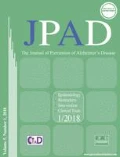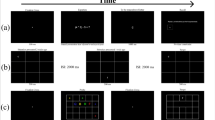Abstract
BACKGROUND
Although evidence suggests that subjective memory complaints (SMCs) could be a risk factor for dementia, the relationship between SMCs and objective memory performance remains controversial. Old adults with or without mild cognitive impairment (MCI) may represent a highly heterogeneous group, based partly on the demonstrated variability in the level of executive function among those individuals. It is reasonable to speculate that the accuracy of the memory-monitoring ability could be affected by the level of executive function in old adults.
OBJECTIVE
This study investigated the effects of executive function level on the consistency between SMCs and objective memory performance while simultaneously considering demographic and clinical variables in nondemented older adults.
SETTING
Participants were recruited from both the memory clinics and local communities.
Participants
Participants comprised 65 cognitively normal (CN) older adults and 54 patients with MCI.
MEASUREMENTS
Discrepancy scores between subjective memory evaluation and objective memory performance were calculated to determine the degree and directionality of the concordance between subjective and objective measures. Demographic, emotional, genetic, and clinical information as well as several executive function measurements were collected.
RESULTS
The CN and MCI groups exhibited similar degrees of SMC; however, the patients with MCI were more likely to overestimate their objective memory ability, whereas the CN adults were more likely to underestimate their objective memory ability. The results also revealed that symptoms of depression, group membership, and the executive function level together predicted the discrepancy between the subjective and objective measures of memory function; however, the executive function level retained its unique predictive ability even after the symptoms of depression, group membership, and other factors were controlled for.
CONCLUSION
Although both noncognitive and cognitive factors were necessary for consideration, the level of executive function may play a unique role in understanding the equivocal relationship of the concurrence between subjective complaints and objective function measures. Through a comprehensive evaluation, high-risk individuals (i.e., CN individuals heightened self-awareness of memory changes) may possibly be identified or provided with the necessary intervention during stages at which objective cognitive impairment remains clinically unapparent.


Similar content being viewed by others
References
Peters F, Villeneuve S, Belleville S. Predicting progression to dementia in elderly subjects with mild cognitive impairment using both cognitive and neuroimaging predictors. J Alzheimers Dis 2014;38(2): 307–18.
Wolfsgruber S, Polcher A, Koppara A, Kleineidam L, Frolich L, Peters O, et al. Cerebrospinal Fluid Biomarkers and Clinical Progression in Patients with Subjective Cognitive Decline and Mild Cognitive Impairment. J Alzheimers Dis, 2017.
Jessen F, Wolfsgruber S, Wiese B, Bickel H, Mosch E, Kaduszkiewicz H, et al. AD dementia risk in late MCI, in early MCI, and in subjective memory impairment. Alzheimers Dement 2014;10(1): 76–83.
Buckley RF, Maruff P, Ames D, Bourgeat P, Martins RN, Masters CL, et al. Subjective memory decline predicts greater rates of clinical progression in preclinical Alzheimer’s disease. Alzheimers Dement 2016;12(7): 796–804.
Abner EL, Kryscio RJ, Caban-Holt AM, Schmitt FA. Baseline subjective memory complaints associate with increased risk of incident dementia: the PREADVISE trial. J Prev Alzheimers Dis 2015;2(1): 11–16.
Seo EH, Kim H, Lee KH, Choo IH. Altered Executive Function in Pre-Mild Cognitive Impairment. J Alzheimers Dis 2016;54(3): 933–40.
Edmonds EC, Delano-Wood L, Galasko DR, Salmon DP, Bondi MW, Alzheimer’s Disease Neuroimaging I. Subjective cognitive complaints contribute to misdiagnosis of mild cognitive impairment. Journal of the International Neuropsychological Society: JINS 2014;20(8): 836–47.
Zlatar ZZ, Muniz M, Galasko D, Salmon DP. Subjective Cognitive Decline Correlates With Depression Symptoms and Not With Concurrent Objective Cognition in a Clinic-Based Sample of Older Adults. The journals of gerontology Series B, Psychological sciences and social sciences, 2017.
Chen ST, Siddarth P, Ercoli LM, Merrill DA, Torres-Gil F, Small GW. Modifiable risk factors for Alzheimer disease and subjective memory impairment across age groups. PloS one 2014;9(6): e98630.
Chhetri JK, de Souto Barreto P, Cantet C, Cesari M, Coley N, Andrieu S, et al. Trajectory of the MAPT-PACC-Preclinical Alzheimer Cognitive Composite in the Placebo Group of a Randomized Control Trial: Results from the MAPT Study: Lessons for Further Trials. J Prev Alzheimers Dis 2018;5(1): 31–35.
Jonker C, Geerlings M, Schmand B. Are Memory Complaints Predictive for Dementia? A Review of Clinical and Population-based Studies. Int J Geriatr Psychiatry 2000;15: 983–91.
Zhang X, Schmitt FA, Caban-Holt AM, Ding X, Kryscio RJ, Abner E. Diabetes mitigates the role of memory complaint in predicting dementia risk: Results from the Prevention of Alzheimer’s Disease with Vitamin E and Selenium Study. J Prev Alzheimers Dis 2017;4(3): 143–48.
Krell-Roesch J, Woodruff BK, Acosta JI, Locke DE, Hentz JG, Stonnington CM, et al. APOE epsilon4 Genotype and the Risk for Subjective Cognitive Impairment in Elderly Persons. J Neuropsychiatry Clin Neurosci 2015;27(4): 322–5.
Royall DR, Lauterbach EC, Cummings JL, Reeve A, Rummans TA, Kaufer DI, et al. Executive Control Function: A Review of Its Promise and Challenges for Clinical Research. A report from the Committee on Research of the American Neuropsychiatric Association. The Journal of neuropsychiatry and clinical neurosciences 2002;14(4): 377–405.
Morson SM, Moulin CJ, Souchay C. Selective deficits in episodic feeling of knowing in ageing: a novel use of the general knowledge task. Acta Psychol (Amst) 2015;157: 85–92
Sacher M, Isingrini M, Taconnat L. Effects of aging and divided attention on episodic feeling-of-knowing accuracy. Acta Psychol (Amst) 2013;144(2): 258–63.
Chang YL, Jacobson MW, Fennema-Notestine C, Hagler DJ, Jr., Jennings RG, Dale AM, et al. Level of executive function influences verbal memory in amnestic mild cognitive impairment and predicts prefrontal and posterior cingulate thickness. Cereb Cortex 2010;20(6): 1305–13.
Winblad B, Palmer K, Kivipelto M, Jelic V, Fratiglioni L, Wahlund LO, et al. Mild cognitive impairment-beyond controversies, towards a consensus: report of the International Working Group on Mild Cognitive Impairment. Journal of Internal Medicine 2004;256(3): 240–46.
Jak AJ, Bondi MW, Delano-Wood L, Wierenga C, Corey-Bloom J, Salmon DP, et al. Quantification of five neuropsychological approaches to defining mild cognitive impairment. Am J Geriatr Psychiatry 2009;17(5): 368–75.
Hua MSC, B.S.; Lin, K.N.; Yang, J.M.; Lu, S.R.; Chen, H.Y. Wechsler Memory Scale (WMS), Third Edition. Taipei, Taiwan: The Chinese Behavioral Science Corporation.
Delis DCK, J. H.; Kaplan, E.; Ober, B. A. Manual for the California Verbal Learning Test, (CVLT-II). San Antonio, TX: The Psychological Corporation, 2000.
Green P, Gervais R, Merten T. Das Memory Complaints Inventory (MCI): Gedächtnisstörungen, Beschwerdenschilderung und Leistungsmotivation. Neurologie & Rehabilitation 2005;11(3).
D’Agostino RB, Wolf PA, Belanger AJ, Kannel WB. Stroke risk profile: adjustment for antihypertensive medication. The Framingham Study. Stroke 1994;25(1): 40–3.
Liu CY, Wang SJ, Teng EL, Fuh JL, Lin CC, Lin KN, et al. Depressive disorders among older residents in a Chinese rural community. Psychological Medicine 1997;27: 943–49.
Chang YL, Yen YS, Chen TF, Yan SH, Tseng WY. Clinical Dementia Rating Scale Detects White Matter Changes in Older Adults at Risk for Alzheimer’s Disease. Journal of Alzheimer’s disease: JAD 2016;50(2): 411–23.
Miskowiak KW, Petersen JZ, Ott CV, Knorr U, Kessing LV, Gallagher P, et al. Predictors of the discrepancy between objective and subjective cognition in bipolar disorder: a novel methodology. Acta Psychiatr Scand 2016;134(6): 511–21.
Stuss DT, Levine B. Adult clinical neuropsychology: lessons from studies of the frontal lobes. Annual review of psychology 2002;53(1): 401–33.
Galeone F, Pappalardo S, Chieffi S, Iavarone A, Carlomagno S. Anosognosia for memory deficit in amnestic mild cognitive impairment and Alzheimer’s disease. Int J Geriatr Psychiatry 2011;26(7): 695–701.
Zamboni G, Drazich E, McCulloch E, Filippini N, Mackay CE, Jenkinson M, et al. Neuroanatomy of impaired self-awareness in Alzheimer’s disease and mild cognitive impairment. Cortex 2013;49(3): 668–78.
Vannini P, Amariglio R, Hanseeuw B, Johnson KA, McLaren DG, Chhatwal J, et al. Memory self-awareness in the preclinical and prodromal stages of Alzheimer’s disease. Neuropsychologia 2017;99: 343–49.
Fragkiadaki S, Kontaxopoulou D, Beratis IN, Andronas N, Economou A, Yannis G, et al. Self-awareness of cognitive efficiency: Differences between healthy elderly and patients with mild cognitive impairment (MCI). J Clin Exp Neuropsychol 2016;38(10): 1144–57.
Rabin LA, Smart CM, Amariglio RE. Subjective Cognitive Decline in Preclinical Alzheimer’s Disease. Annu Rev Clin Psychol 2017;13: 369–96.
Balash Y, Mordechovich M, Shabtai H, Giladi N, Gurevich T, Korczyn AD. Subjective memory complaints in elders: depression, anxiety, or cognitive decline? Acta Neurol Scand 2013;127(5): 344–50.
Acknowledgements
The authors thank Yen-Shiang Chiu, Chia-Hua Lin, and Yi-Yuan Zhuo for assistance in data collection, and Dr. Jung-Lung Hsu for constructive feedbacks.
Funding
This work was supported by the Taiwan Ministry of Science and Technology (grant numbers 107-2314-B-182A-065 and108-2410-H-002-106-MY2 to Y.L.C.). The sponsors had no role in the design and conduct of the study; in the collection, analysis, and interpretation of data; in the preparation of the manuscript; or in the review or approval of the manuscript.
Author information
Authors and Affiliations
Corresponding author
Ethics declarations
The institutional Review Board(IRB) approved this study, and all participants gave informed consent before participating.
Additional information
Conflict of interest
The authors have no conflict of interest to report.
Rights and permissions
About this article
Cite this article
Chao, RY., Chen, TF. & Chang, YL. Executive Function Predicts the Validity of Subjective Memory Complaints in Older Adults beyond Demographic, Emotional, and Clinical Factors. J Prev Alzheimers Dis 8, 161–168 (2021). https://doi.org/10.14283/jpad.2020.61
Received:
Accepted:
Published:
Issue Date:
DOI: https://doi.org/10.14283/jpad.2020.61




